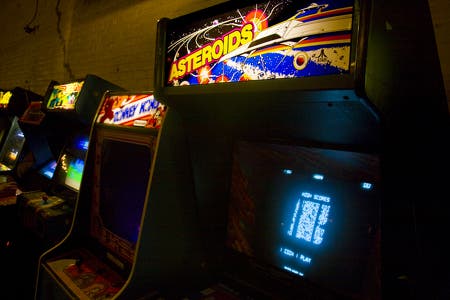Nolan Bushnell: Gaming's absent father
From the archive: Simon Parkin goes in search of Atari's founder.
Each week, Eurogamer presents a highlight from our archives - and today, in this profile piece from 2012, Simon Parkin goes in search of Nolan Bushnell, the man who helped popularise the medium of video games before turning his back on them.
Barcade, 388 Union Avenue, Brooklyn. Founded in 2004 in a former metal shop it's an establishment that expresses its gimmickry through its name with rare economy: a bar themed around exotic beers and 1980s arcade machines.
It has little of the grime and grubbiness of its New York amusement arcade forerunners, whose players would hunch like addicts, swapping tips in hushed whispers as they competed for high score dominance 25 years ago. For Barcade's patrons, most of whom are in their 20s, this is, rather, a museum of outmoded technology.
They wear much the same uniform as their forebears (in 1983, British author Martin Amis described the wardrobe of the New York arcade 'vidkid' as: "wooly hat, earphones, windbreaker, jeans, moonboots and a Rubik's Cube keyring") but today's clientele come for the ambiance, not the addiction. Rather, this parade of hands-on exhibits are curios whose bleeps and flashes provide an atmospheric link to a past lone gone but, through Space Invaders' and Pac-Man's iconography, not forgotten - fashionable even.
Regardless of the zeitgeist that gathered these machines here today, there's something transporting about their physicality. Stare into the Asteroid field, face bathed in white five inches from the screen, and the experience is no less mesmerising than when it rolled out of Ed Logg's mind and into bars in 1979. Barcade offers a glimpse of how things once were, when the industry was still in its mewling infancy yet boisterous and ambitious nonetheless. Grasp an arcade stick here and you shake hands with one of video gaming's proto-Adams, that which begat Galaxian, which begat Defender, which begat Elite, which begat Super Mario World. Those who adore games come here to reconnect with that past.
But what of the man who begat them all - if not via the invention of the video game itself, then in the business he created that drove them into the cultural consciousness? Where in the world is Nolan Bushnell?
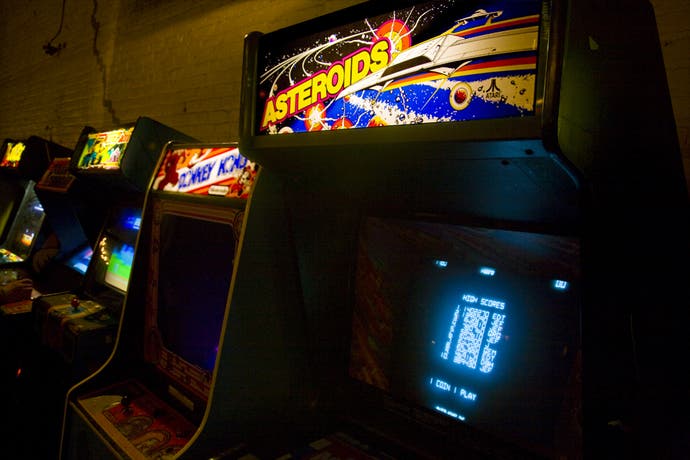
Nolan Bushnell founded Atari on June 27, 1972. But 40 years later, where many of his contemporaries are still active in games, Bushnell is an absent father to the medium he helped establish. In fact, he sold Atari just four years after he created it for $28 million. But not before he and his designers had defined the basic vocabulary of video games, proto-verbs the industry still uses today. The company was the first to view game designers not as production line workers but as creative artisans tasked with defining the language and boundaries of this new medium.
"Being a tangential but historical player in the games industry means I have to answer a lot of questions like the one you just asked me. They've all been asked and I've answered them. It's boring. OK?"
Bushnell gave Steve Jobs his first job (helping to program Breakout) and fathered the company that gave Steven Spielberg his first $25 million game deal (the licensed game for E.T. whose massive commercial failure buried both Atari and the wider games industry throughout the mid-1980s). But after founding Chuck E. Cheese's Pizza Time Theatre, a chain of American restaurants that formally combined the arcade and the pizza, he broke nearly all contact with games, turning his entrepreneurial attention to GPRS and robotics.
Today he is visiting NYU, a 30-minute subway ride from Barcade - where I wind up after our meeting hoping to unwind and reflect - as speaker at the Games For Change festival. Three hours before Asteroids woos, Bushnell gives his keynote address, a wide-ranging talk to promote his latest venture, Brainrush, a programme that hopes to use game-like experiences to revolutionise the US education system.
He walks backstage and collapses into a chair. We exchange small talk as he sips water, wishing out loud that it were wine.
After a few minutes, I ask: "You are tangentially involved in the video game industry with what you're doing with Brainrush. But do you miss being right in the centre of it all?"
"Not at all," he says without skipping a beat.
"Why's that?" I ask.
"I don't live life looking in the rear view mirror," he says.
I detect a note of crossness in his baritone voice. "Being a tangential but historical player in the games industry means I have to answer a lot of questions like the one you just asked me. They've all been asked and I've answered them. It's boring. OK?"
Bushnell's entourage, sat opposite him in the dressing room we appropriated for the interview, cackles with laughter at this bolshiness.
He's tired, I figure.
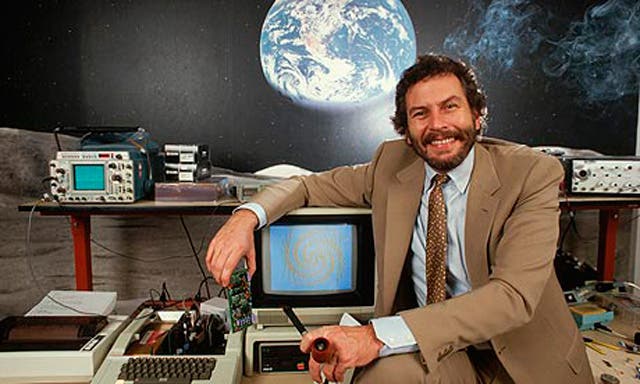
It's been a long day. His morning started with a board meeting before his trip to NYU. Likewise, his speech was over 90 minutes long, accounting for audience questions. Bushnell is a spritely 69-year-old, a mischievous smile usually accompanying his oak-matured voice, but he couldn't disguise the weariness behind his initial comment when he first sat down and asked: "Do you think it's going to be a free bar at the after party?"
"You seem a little irritated by the connection to games," I venture. In truth, we are a little irritated at one another. It's been a long day. "Do you think you peaked too early in your career with Atari?"
There's a moment of taut silence at the barbed question. Then Bushnell sighs and the tension in the room eases.
"I get a lot of credit for Atari," he says. "It's what I am known for. But you know, I think I have done some more interesting things in my career technically, to be honest. I think automobile navigation was a lot harder to accomplish. You know, the tech inside TomTom? A lot of people don't know I had anything to do with designing that. And my robotics company was a technological tour-de-force at the time. It was only because of a couple of screwy things it was a failure."
"I get a lot of credit for Atari. It's what I am known for. But you know, I think I have done some more interesting things in my career technically, to be honest."
"Nevertheless, games are what you are known for," I say. "Do you still play them?"
"I just pretty much finished playing Minecraft," he says.
"What did you build?"
He laughs, warmly. "I didn't build that much. I built a really cool castle that was big and tall and everything. I went down as far as I could, of course. I wanted to find out how deep I could go. Who doesn't want to do that?"
"What attracts you to that game?" I say.
"I like the concept of an open-ended building game environment," he says. "The idea that night-time comes and bad guys arrive and if you don't have shelter then you're not safe. That is genius. And we've been playing Mafia too. Me and my family."
"As in the parlour game?"
"Yeah. That is a great game. My kids all found out it's really fun to do because they can kill me with reckless abandon, with no moral hazard. So there's a lot of latent aggressiveness they can get out."
Bushnell's face lights up at the mention of his children. I ask him how old they are.
"They range from 18 to 43. We are a very close family. We all live in the same area except for one daughter."
"Did you encourage them to play video games?"
"Oh yeah. My youngest, Wyatt: I started him at age one-and-a-half on computer games. I had an office in the basement of my house and he'd say: 'I'm going down to work with my dad'. I had his computer set up for him and... You know, I have this wonderful photograph of him with his pacifier in his mouth, his bottle in his left hand and a mouse in his right. He's really focusing on the screen. When he was about three he said: 'Dad, I could do a lot better on this game if I knew how to read'. I said: 'Well, maybe you need to learn'."
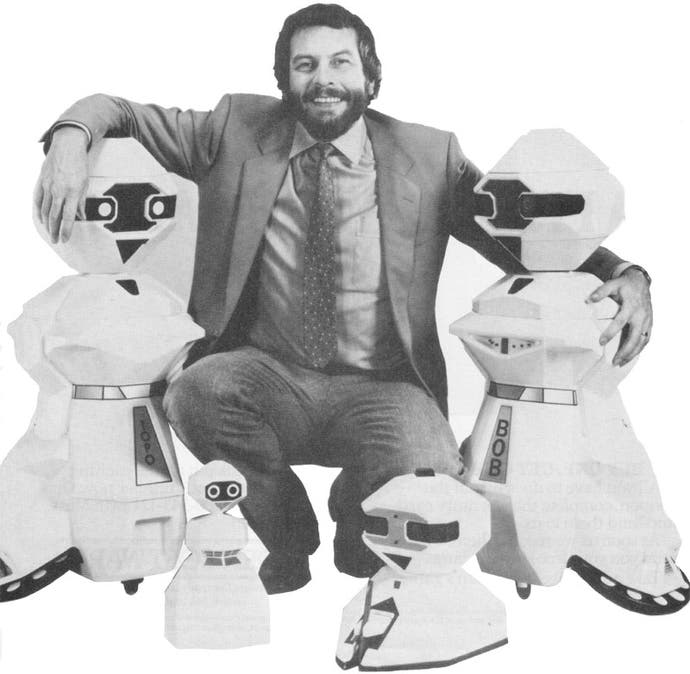
Bushnell's reference to Minecraft is an interesting one. Its creator Markus Persson is as much entrepreneur as game designer, his funding model making him a multi-millionaire before the game was even out of Beta. There are similarities to Bushnell. With this in mind, I ask him if, were he 30 years younger, how he might enter the industry. Would he aim for innovation, or something else?
"First of all I wouldn't enter the video game industry," he replies. "I don't like to go into red oceans. If I don't have a significant innovation I don't like to try it. It's just too much hard work. And right now, iPhone games - even if you have a great game, discoverability is really hard. The reason I'm in education right now is because it's massively screwed up, and the technology is manageable and doable. And so, in the classical definition of a poet who interprets God for the masses: I want to interpret technology for the education business."
Red oceans and managed risk: this is the vernacular of the businessman, not the poet. Bushnell's entrepreneurial spirit has been evident since a young age. At ten he taught himself how to fix TV sets and began charging his neighbours 50 cents to fix theirs when they broke. It was this spirit that made him, but also that later broke him.
His robotics enterprise cost Bushnell more than $20 million and most of the fortune he had amassed from the sale of Atari. He was forced to move from his $6 million mansion in Woodside, California, to a smaller house in Los Angeles. He sold his personal Learjet. And yet, this misfortune hasn't dampened his seemingly insatiable appetite for venture - in the subsequent years he's founded no fewer than 20 companies.
"Quite candidly I don't know what winding down is. Preparing to die? I don't think so. Also, it turns out that people who are engaged age more slowly than those who have sort of bailed. The fastest way to die is to retire."
"Is it the opportunity for invention or the opportunity for business that attracts you to education?" I ask.
"Both, for sure," he says. "But more than those things, I love science. Everybody thinks of me as an engineer or businessman. I think of myself as a scientist. I am excited about what we are going to discover. Because once you know the moment of cognition - magic shit happens."
"You seem very energised ," I note. "It's not like you're winding down at all."
"Quite candidly I don't know what winding down is," he retorts. "Preparing to die? I don't think so. Also, it turns out that people who are engaged age more slowly than those who have sort of bailed. The fastest way to die is to retire. Statistically, when people retire they shave seven years of their actuarial age. I'm sure there's active retirement and passive retirement, and I'm sure the data is a little skewed because a lot of people retire because they are sick... But still, the data is there."
Bushnell is full of these asides. Perhaps it's his ADHD, but his conversation is filled with facts, a pitter-patter of anecdotes and ideas. When I ask him if he feels any fondness for the industry he founded he begins to fantastise about potential ideas he could bring to the table if he were to return - despite his earlier assertion that he's happy to keep away.
"If I was to re-enter the industry today I would focus strictly on Augmented Reality," he says, before the thought is superseded by the next: "I like the idea of casual mesh networks actually. So, for example, you would be on a subway car with your iPhone. Can you create an app that sets up a quick mesh network that you can play a game on in 25 seconds? Those casual groups of strangers you pass in the physical space are very interesting in terms of games."
Before I have chance to ask him more about the idea he's on to the next one, this one unrelated to games. "Right, here's a couple of really good ideas," he says, sitting forward in his chair. "I want a mouth keyboard. I want to be able to send a text with my tongue. I just got a ticket for texting while driving and I don't want that again."
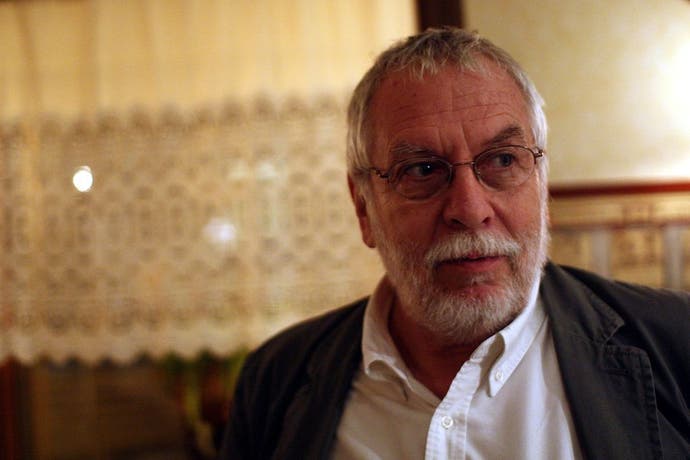
"What's the other one?" I ask.
"I am doing this thing putting microphones in glasses, so that when I look at a person who is speaking their voice is amplified. That way I can have a good conversation in a noisy restaurant."
"It's interesting you mention playing in public spaces to bring people together naturally," I say. "Arcades were such a great space for that - it was a destination - everyone knew why they were going there and so it broke down a social wall in that respect. Strangers could interact because they shared a common goal. Isn't there an issue now as we don't have fixed locations? Isn't there a social barrier there that needs to come down?"
"That's a great point," he says. "I would love to design a new arcade. Arcades traditionally bridge the gap between technologies that were expensive and available in labs but not available commercially with the masses."
He pauses, as if looking for the conversation thread. Then, another idea, this time a role-playing pitch to revitalise play in a public forum: "I have designed a game experience which is in a public place, but teams of strangers go in and save the world.
"The world always needs to be saved, right? What you probably don't realise is that the Oni-ons - the bastards that they are - have shut down the network on my space platform. You are part of the team transported up (there are eight of us) and we have to get the space platform back online. In order to do that we have to go through and fix a lot of shit up there.
"We have to get through a laser maze. We have to restock the reactor with dilithium crystals, then we have to get the thing up and running again. It has to be done manually because the robots aren't working. Without the power of the reactor they are all shut down. One of the things that is a big concern is that once you get the reactor started, the countdown begins. But the damned reactor isn't shielded. We are going to fry our asses..."
He elaborates for close to five minutes, telling the story with a glint in his eye but also, in his playfulness, revealing something of his irresistible self-belief. No wonder he has won investment from so many pockets over the years.
"...So it takes 45 minutes to complete and is priced exactly the same as a movie ticket," he says, with a final flourish.
"People talk about innovation. I say you can't give good ideas away. It's only when they're proven you worry about them."
"Is this something you are making? Is there a prototype?" I ask, with some disbelief.
Bushnell shrugs. "I have a design. One of these days I'll work on it. But I need to save education first."
His flair for design when elaborating his vision of the space station arcade game surprised me. I always understood Bushnell as being the financial facilitator for the men who created our earliest games. I didn't pen him as a game-maker.
"Would you describe yourself as a game designer?" I ask.
"I am a scientist," he shoots back, before adding: "With a mind that gets bored very easily."
"But you are a playful character I think," I say.
"Always. I've always been a practical joker. I was probably the only kid in my block that had a blockhouse in his backyard so I could blow shit up and not hurt myself."
"Did your parents encourage this sense of play?"
"They tolerated it," he says. "I was always invoking the mother's curse. I was a bit of a handful to be honest."
"How did they feel about your successes?"
"Very, very surprised."
"What's your most vivid memory of those times?"
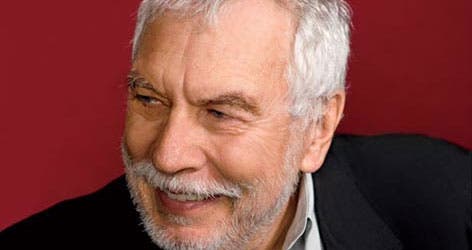
"The most vivid ones I can't talk about."
"Why's that?" I ask, missing his mischievousness.
"I have a family!"
We all laugh. Bushnell sits back in his chair and, for the first time in our conversation, allows himself to reminisce.
"The best game that I ever played at Atari was the game of putting my competitors out of business," he says, not looking at me. "I really turned out to be pretty good at that.
"You know, Atari didn't ship the most Pong games. We were heavily copied. The good news was that anybody with a garage shop could make a Pong game - because that's all I had. But later on everybody thought: we'll just copy Atari stuff because they can't build very fast. We were always undercapitalised because nobody believed in video games. Did you know we were at 40 million sales before we got any venture capital? It's crazy."
"People talk about innovation. I say you can't give good ideas away. It's only when they're proven you worry about them. Figuring out ways to trick the copiers was great fun for me. I think of one particular time when we mismarked some chips. They got hold of one of our boards and ordered in the chips. They filled their floor with the stuff and none of their computers would work. The lifetime of a coin-op is six to 12 months, It would take them six months to copy - so if you add three months for them to sort out this head fake I gave them, they only had three months left for market. So they had all of these products that they couldn't sell."
"Everybody thinks of me as an engineer or businessman. I think of myself as a scientist. I am excited about what we are going to discover. Because once you know the moment of cognition - magic shit happens."
Catching my look of disbelief, he adds: "We bankrupted them. I took the whole of Atari over and we had a champagne celebration on their front lawn. Just because we should, right? We toasted their failure."
"And you did this on their premises?" I ask.
"Oh yeah. Right on their lot."
The issue of protecting your game remains pertinent today, especially for developers working on iOS, where 'cloning' is rife. I ask Bushnell what his take on this is having lived through it the first time.
"Theft is a problem," he says. "But ideas are very hard to protect..." He trails off, as if unsure of his argument. " I don't know. I feel like people should be pretty honest. You could fool others with the technology then, but these days you cannot. I believe that business is war. I believe it's OK to whack your competition if you can. That's what it's all about. But you want to do it kind of fairly."
"How do you define fair?" I ask.
"I have no idea."
Perhaps that's no great surprise. Business hasn't, in so many ways, been 'fair' to Bushnell. In 1983, at 40, he was on top of the world, a multi-millionaire with a thriving restaurant chain, a future in robotics and a sailboat that he raced to fourth place in that year's Transpacific Yacht Race. Today he lives in modest circumstances, his previous failed company uWink having closing its offices located in one of the poorer areas of Los Angeles in 2010.
His professional life has not been defined by fairness in any orthodox sense, instead offering a rollercoaster ride of early success and latter struggle, punctuated by the occasional resounding triumph (Etak, which made the first navigation system for cars, sold to Rupert Murdoch for $50 million in 1989).
But Bushnell has always been one to chase ideas, not to settle down with the rewards snared from his early victories. The very idea seems repellent to him, which is perhaps why he is so loath to talk about video games in anything other than the role of Minecraft player. Perhaps he feels regret at getting out so early on; at not having fostered the medium he helped birth. Or perhaps it's mere irritation at the reminder that so many of his great successes came so soon in his career. Whatever the reason, it's history he prefers to not revisit.
"Let's continue this over email," he says, standing, eager to make it to the after show party before it's too late.
"No problems," I say.
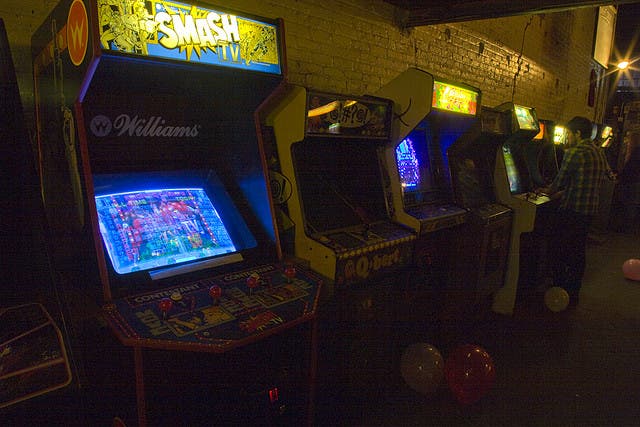
I take the subway to Brooklyn, and walk into Barcade, curiously melancholic. A machine changes a $10 note into quarters and I stare at the parade of immaculate machines.
Asteroids arrests. Its piercing white vector lines seem to offer a vision of a future that never was - one that seems somehow brighter than the one we were dealt.
Next to me a girl finishes her first game of Frogger. She looks up at the marquee, the strip of backlit artwork positioned at the top of the machine. It shows an artist's impression of a frog sprinting, suited, leather briefcase in hand.
She looks at me and says: "So after all that Frogger's just late for work? I mean, he's just a businessman?"
"Yeah. Yeah, I guess that's what he was."
...........
Two weeks later I email Bushnell to ask him what he thinks of Barcade.
His reply reads, simply: "I've heard about it but have not been there. Nolan"
